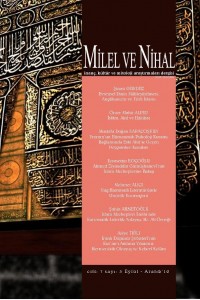Abstract
Secularism that brought the enlightenment with itself, created its own holiness instead of sacredness of religion. Psychology has been affected deeply through this systematic change of perception, alike the other branches of the science. Seeing religion as an irrational and a dogmatic field, many of the famous psychologists had approached to it in a reductive way. Erich Fromm, who is the representative of humanistic approach which can be seen as relatively moderate among these approaches, sees religion and religious culture quite functional in respect of that they have humanistic character, and able to bring to light the different talents of the human being and help while struggling with the feel of loneliness. He gives credit to the holy texts accepted by religions and especially he refers to Old Testament and parables of the prophets in his works. Fromm, as he doesn’t see these texts as God’s words, states that these texts are symbolic lives which consist of humanistic messages. Therefore, he has read them in the radical humanistic thinking system according to the social, ideological and scientific patterns. The aim of our study is to interpret his reading style.
References
- Arpaguş, Hatice K., “Mitoloji, Kur’an-ı Kerim Kıssaları ve Kültürel Miras”, M.Ü. İlahiyat Fak. Dergisi, İstanbul, 2003.
- Batson, C. Daniel, W. Larry Ventis, The Religious Experience, New York, 1982.
- Dietrich, Jan, “The Religious Understanding of Erich Fromm ”, www. erich.fromm.de (09.01.2012).
- Erhat, Azra, Mitoloji Sözlüğü, İstanbul, 1978.
- Firûzâbâdî, Kamûs, “k-s-s” mad., Beyrut, trs.,
- Funk, Rainer, “Biophilia and Fromm’s Critisizm of Religion”, www. erich.fromm.de (18.05.2005).
- Gusdorf, Georges, İnsan ve Tanrı, çev. Zeki Özcan, İstanbul, 2000.
- Gündüz, Şinasi, “Kutsal Hakkında Konuşmak: Dinsel Söylemde Mitos”, Milel ve Nihal, c.6, İstanbul, 2009.
- İbn Manzûr, Lisanü’l-Arab, “k-s-s” maddesi, Beyrut, trs.
- Kaya, Remzi, Kur’an-ı Kerim Kıssaları ve Düşündürdükleri, Uludağ Üni- versitesi İlahiyat Fak. Dergisi, c.11, Bursa, 2002.
- Kitabı Mukaddes (Eski Ahit)
- Lungren, Suante, Erich Fromm’s Judaism, www. erich.fromm.de (09.01.2012).
- Shapira, Jochack, Fromm and Judaism, www. erich.fromm.de (09.01.2012).
- Yıldırım, Suat, Kur’an-ı Kerim’de Kıssalar, Atatürk Üniversitesi İlahiyat Fak. Dergisi, c.3, Erzurum, 1979.
- Zebidî, Tâcü’l-Arûs, “k-s-s” mad., Kuveyt, 1973.
Abstract
Aydınlanma döneminin beraberinde getirdiği sekülerizm, dine ait kutsalların yerine kendi kutsallarını yaratmıştır. Bu sistemli algı değişiminden, bilimin pek çok alanı gibi psikoloji de derinden etkilenmiştir. Pek çok ünlü psikolog, dini, irrasyonel ve dogmatik bir alan olarak görüp ona indirgemeci tarzda yaklaşmışlardır. Bu yaklaşımlar içinde, nispeten ılımlı olarak nitelendirebileceğimiz hümanistik yaklaşımın bir temsilcisi olan Erich Fromm, din ve dini kültürü, hümanistik bir karaktere sahip olması, insanın farklı yeteneklerini ortaya çıkarmasını sağlaması ve yalnızlık duygusuyla başa çıkmasında ona destek olması gibi noktalardan işlevsel görmektedir. O, dinlerde kutsal kabul edilen metinlere değer vermekte, özellikle Eski Ahit ve peygamber kıssalarına eserlerinde sık sık atıflarda bulunmaktadır. Fromm, Tanrı sözü olarak görmediği bu metinlerin, hümanist mesajlar içeren sembolik yaşantılar olduğunu söylemektedir. Böylece onları, radikal hümanistik düşünce sistemi içinde, inandığı sosyal, ideolojik ve bilimsel şablonlara göre okumaktadır.
Keywords
References
- Arpaguş, Hatice K., “Mitoloji, Kur’an-ı Kerim Kıssaları ve Kültürel Miras”, M.Ü. İlahiyat Fak. Dergisi, İstanbul, 2003.
- Batson, C. Daniel, W. Larry Ventis, The Religious Experience, New York, 1982.
- Dietrich, Jan, “The Religious Understanding of Erich Fromm ”, www. erich.fromm.de (09.01.2012).
- Erhat, Azra, Mitoloji Sözlüğü, İstanbul, 1978.
- Firûzâbâdî, Kamûs, “k-s-s” mad., Beyrut, trs.,
- Funk, Rainer, “Biophilia and Fromm’s Critisizm of Religion”, www. erich.fromm.de (18.05.2005).
- Gusdorf, Georges, İnsan ve Tanrı, çev. Zeki Özcan, İstanbul, 2000.
- Gündüz, Şinasi, “Kutsal Hakkında Konuşmak: Dinsel Söylemde Mitos”, Milel ve Nihal, c.6, İstanbul, 2009.
- İbn Manzûr, Lisanü’l-Arab, “k-s-s” maddesi, Beyrut, trs.
- Kaya, Remzi, Kur’an-ı Kerim Kıssaları ve Düşündürdükleri, Uludağ Üni- versitesi İlahiyat Fak. Dergisi, c.11, Bursa, 2002.
- Kitabı Mukaddes (Eski Ahit)
- Lungren, Suante, Erich Fromm’s Judaism, www. erich.fromm.de (09.01.2012).
- Shapira, Jochack, Fromm and Judaism, www. erich.fromm.de (09.01.2012).
- Yıldırım, Suat, Kur’an-ı Kerim’de Kıssalar, Atatürk Üniversitesi İlahiyat Fak. Dergisi, c.3, Erzurum, 1979.
- Zebidî, Tâcü’l-Arûs, “k-s-s” mad., Kuveyt, 1973.
Details
| Primary Language | Turkish |
|---|---|
| Journal Section | Articles |
| Authors | |
| Publication Date | September 1, 2010 |
| Submission Date | November 5, 2014 |
| Published in Issue | Year 2010 Volume: 7 Issue: 3 |


